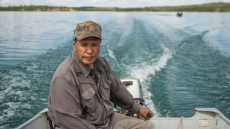TORONTO — Many women are receiving unnecessary treatment for a condition that is sometimes called Stage 0 breast cancer, the findings of a new Canadian study suggest.
Women who undergo single or double mastectomies or radiation as treatment for ductal carcinoma in situ, or DCIS, are probably not increasing their chances of survival, the paper argues.
The vast majority of patients — nearly 97 per cent — are expected to still be alive 20 years after their diagnosis, based on the findings of the study done by researchers at Toronto's Women's College Hospital and the University of Toronto; it is published in the journal JAMA Oncology.
While 3.3 per cent will die, aggressive treatments do not appear to alter the course their disease takes, the scientists report.
With DCIS, cancerous cells are found in the milk ducts of the breast. The current approach to DCIS is to remove the affected portion of the breast and treat with radiation to lower the risk the cancer will return or spread. But some women want more reassurance and opt for surgery to remove one or both breasts.
An editorial accompanying the article argues the findings should lead to a dialling back of the way women diagnosed with DCIS are treated.
"It's not an emergency. It's just not an emergency," Dr. Lisa Esserman, lead author of the editorial, said in a telephone interview.
"We need to stop the urgency, be more thoughtful, start generating different approaches, think about it as prevention."
For Esserman, who is the director of the University of California, San Francisco breast care centre, the findings support the notion that some women with DCIS may not need surgery at all.
Just in the way many prostate cancers are now treated, she said, the right approach may be to actively monitor these women, only treating if the cancer progresses.
The lead author of the paper, Toronto breast cancer expert Dr. Steven Narod, isn't necessarily advocating that approach.
Narod said he believes the death rate would be higher than 3.3 per cent if women with DCIS did not have surgeries to remove the cancerous cells — though how much higher would be a guess.
"The surgeons cure 97 per cent of it. If you did nothing ... we don't know what would happen," he said.
The study design is what is called observational. It looked at the medical records of over 100,000 women diagnosed with DCIS between 1988 and 2011 and assessed whether treatments had an impact and how many patients were still alive after 10 and 20 years.
The large numbers lend confidence to the findings. But an observational study cannot prove that one course of action is better than another.
The death rate at 10 years after the diagnosis was 1.1 per cent, rising to 3.3 per cent at 20 years.
Esserman's editorial noted that the 20-year rate is similar to what the American Cancer Society estimates is the average woman's risk of dying of breast cancer in her lifetime.
There was a subset of women for whom the risk was much higher. Women diagnosed with DCIS before the age of 35 had a mortality rate that was 17 times higher than would be expected for them in the nine years following their diagnosis. But only one per cent of the women in the study were diagnosed under the age of 35.
Esserman said breast cancer researchers now need to do a better job of figuring out who is at higher risk of dying after a DCIS diagnosis and finding ways to prevent those deaths. Scientists also need to figure out how much treatment — if any — is needed for most women diagnosed with DCIS so patients don't undergo unneeded surgeries and therapies.



